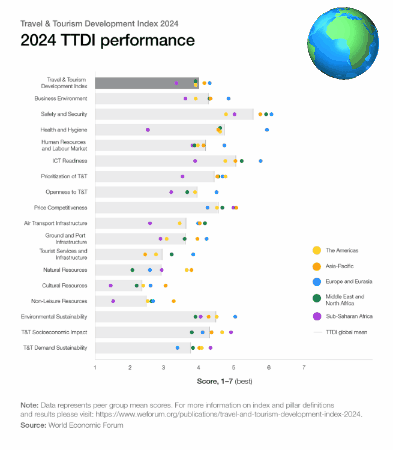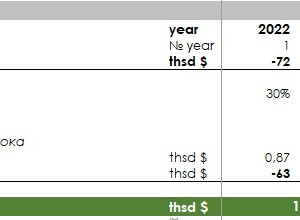World Economic Forum
The World Economic Forum has just released its much-anticipated Travel and Tourism Development Index (TTDI) for 2024. This comprehensive report sheds light on how countries across the globe are fostering their travel and tourism sectors, highlighting significant improvements and ongoing challenges. With developing economies showing remarkable strides, this index is essential reading for policymakers, business leaders, and tourism professionals aiming to understand the evolving landscape of global travel and tourism.
Why the TTDI 2024 Matters
The Travel and Tourism Development Index (TTDI) is more than just a ranking; and barometer of global progress in a sector that is crucial for economic growth and cultural exchange. The 2024 edition of the TTDI reveals notable advancements, especially among developing economies, and underscores the ongoing efforts needed to bridge the gap between high-income and lower-income countries. This article delves into the key findings, spotlighting the top performers, regions showing significant improvements, and the critical areas needing further investment.
Index overview

The index is comprised of five dimensions, 17 pillars and 102 individual indicators, distributed among the different pillars. However, the five dimensions are not factored into the calculation of the index and are used only for presentation and categorization purposes.
The Enabling Environment dimension captures the general conditions necessary for operating and investing in a country and consists of five pillars:
- Business Environment: This pillar captures the extent to which a country’s policy environment is conducive to companies doing business and investing.
- Safety and Security: This pillar measures the extent to which a country exposes locals, tourists and businesses to security risks.
- Health and Hygiene: This pillar measures healthcare infrastructure and accessibility and health security.
- Human Resources and Labour Market: This pillar measures the availability of quality employees and the dynamism, resilience and equality of the labour market, as well as the level of protection for workers. It consists of the Qualification of the Labour Force, Labour Market Dynamics and Labour Market Resilience and Equality subpillars.
- ICT Readiness: This pillar measures the availability and use of information and communication technology infrastructure and digital services.
Enabling Conditions: The Backbone of Tourism Development
The TTDI emphasizes the importance of enabling conditions – factors that create a supportive environment for travel and tourism to thrive. While developing economies have shown improvement, there remains a significant gap that needs addressing.
- Infrastructure Development: Many countries have invested heavily in improving their infrastructure, a key component of enabling conditions. For example, Indonesia and Brazil have upgraded their airports and transport networks, which has facilitated tourism growth.
- Policy and Regulatory Frameworks: Effective governance and robust regulatory frameworks are crucial. Countries that have streamlined their visa processes and improved safety standards have seen better TTDI scores.
- Sustainability Practices: Sustainable tourism practices are increasingly becoming a priority. Countries that have implemented eco-friendly policies are not only attracting more tourists but are also preserving their natural resources for future generations.
Key Highlights from the TTDI 2024

Saudi Arabia and UAE Lead High-Income Movers: Among high-income countries, Saudi Arabia and the United Arab Emirates stand out. Saudi Arabia climbed from 50th to 41st, while the UAE jumped from 25th to 18th.
Success Stories: Countries Leading the Charge
Saudi Arabia and UAE: Visionary Leadership in High-Income Economies
Saudi Arabia’s Vision 2030 has been a game-changer, focusing on diversifying the economy and boosting the tourism sector. The UAE, with its world-class infrastructure and innovative tourism strategies, continues to set benchmarks in the region.
Challenges and Areas Needing Attention
Despite the positive trends, the TTDI highlights several areas where further improvements are necessary:
- Investment Gaps: Developing economies still face significant investment gaps in infrastructure and services. Closing these gaps is crucial for sustaining growth.
- Sustainability: While some countries have made strides in sustainable tourism, many still lag behind. Implementing comprehensive sustainability practices is essential for long-term success.
The Road Ahead: Strategies for Continued Improvement
1. Leveraging Technology: Embracing digital transformation can enhance the tourist experience and improve operational efficiencies. Countries investing in smart tourism technologies are likely to see substantial gains.
2. Public-Private Partnerships: Collaborative efforts between governments and the private sector can drive significant improvements in infrastructure and services. Such partnerships are crucial for funding and implementing large-scale projects.
3. Focus on Human Capital: Investing in education and training for the tourism workforce can enhance service quality and innovation. Skilled professionals are the backbone of a thriving tourism industry.
Top managers World Economic Forum

- Julien Gattoni Chief Financial Officer and Head of Operations and Resources, Member of the Management Committee
- Mark Spelman Experienced Chair and Non Executive Board Director with previous high profile roles at the World Economic Forum and Accenture
- Zara Nanu Global Future Council on Equity and Social Justice
Charting a Path to Sustainable Growth
The 2024 Travel and Tourism Development Index offers valuable insights into the global tourism landscape, highlighting successes and pinpointing areas needing attention. As we move forward, sustained efforts in improving enabling conditions, embracing sustainability, and fostering inclusive growth will be essential. For policymakers, business leaders, and tourism professionals, the TTDI is an indispensable tool for guiding strategies and investments.
Stay ahead of the curve in the dynamic world of travel and tourism. Subscribe to our newsletter for the latest insights, trends, and strategies to boost your tourism business. Let’s work together to create a more inclusive, sustainable, and prosperous global tourism industry.
About World Economic Forum
The World Economic Forum (WEF) is an international organization dedicated to enhancing global conditions through public-private partnerships. Engaging leaders from political, business, academic, and other sectors, the WEF fosters collaboration to shape agendas across global, regional, and industry levels. The institution builds sustained communities by integrating high-level meetings, research networks, task forces, and digital collaboration. It delivers exceptional value to its partners and members through annual and regional meetings, specialized centers focusing on global and regional issues, future-oriented communities of new champions, expert networks of global agenda councils, and a robust knowledge and interaction platform, including the Forum Academy. Established in 1971 as a not-for-profit foundation, the World Economic Forum is headquartered in Geneva, Switzerland.
The World Economic Forum ranked 23347 by Crunchbase
June 7, 2024
















I believe that the publication of the Tourism and Travel Development Index (TTDI) 2024 from the World Economic Forum provides important insights into understanding the global tourism landscape. This index not only highlights achievements, especially among emerging economies, but also identifies areas that require further investment and improvement.
The successes of Saudi Arabia and the UAE are particularly noteworthy, which are showing significant progress thanks to strategic initiatives and investments in infrastructure. However, despite the positive trends, challenges remain, such as investment gaps and the need to implement sustainable practices.
For further growth and development of tourism, it is important to focus on digital transformation, public-private partnerships, and human capital development. TTDI 2024 serves as an indispensable tool for policy makers, business leaders and tourism professionals, helping to guide strategies and investments for the future.